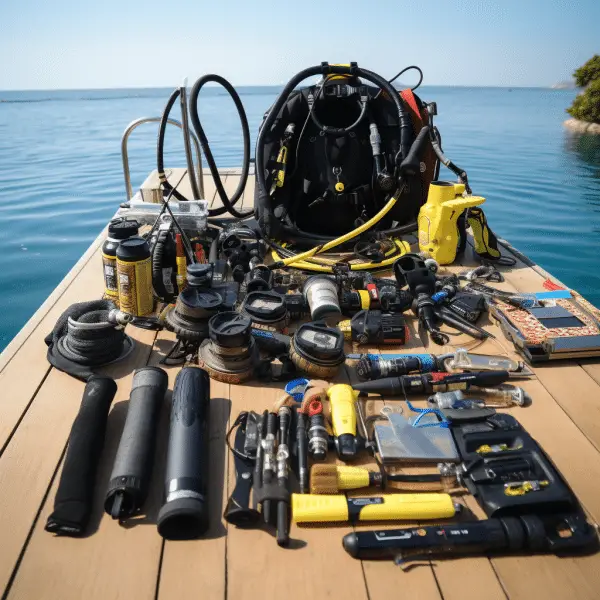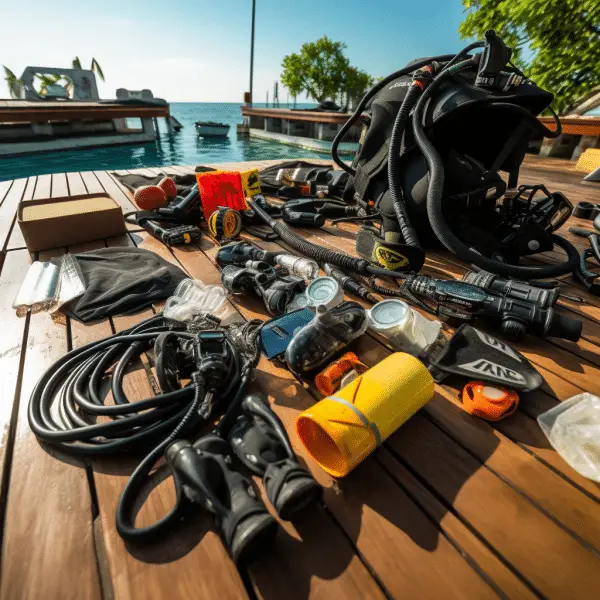As a PADI Professional, it’s crucial for me to properly maintain my dive equipment to ensure it remains in top shape and functions optimally. With heavy use and exposure to various conditions, regular maintenance is essential to extend the lifespan of my gear.
Follow these 5 tips to keep your dive equipment well-maintained:
- Rinse thoroughly after every dive: Removing saltwater and debris is key to preventing corrosion and damage.
- Dry properly to prevent bacterial growth: Properly drying all gear, especially wet elements like wetsuits, helps prevent the growth of mold and bacteria.
- Check moving parts regularly for dirt and defects: Ensure that all parts, such as buckles and straps, are free from dirt and defects that may compromise their functionality.
- Deep-clean and maintain your gear regularly: Use appropriate cleaning products and techniques to remove stubborn dirt and maintain the integrity of the materials.
- Store your equipment properly to avoid damage and deformation: Storing gear in a clean, dry, and appropriate environment helps prevent damage and prolongs its lifespan.
By following these steps, I can set an example as a responsible diving professional and demonstrate the importance of well-maintained gear to my students and fellow divers.
Key Takeaways:
- Regular maintenance of dive equipment is essential for optimal performance and longevity.
- Rinse gear thoroughly after every dive to remove saltwater and debris.
- Dry all equipment properly to prevent bacterial growth and damage.
- Check moving parts regularly for dirt and defects that may affect functionality.
- Deep-clean and maintain gear using appropriate products and techniques.
- Store equipment in a clean, dry, and appropriate environment to prevent damage and deformation.
Proper Care for Specific Dive Gear Pieces

To ensure the longevity and optimal performance of your dive gear, it is essential to provide specific care and maintenance for each piece. By following these tips, you can extend the lifespan of your equipment and enjoy a safe and comfortable diving experience.
BCD Maintenance
After every dive, it is important to thoroughly rinse your BCD (Buoyancy Control Device) to remove any saltwater or debris. Pay special attention to draining out any trapped saltwater from the bladder. It is recommended to inflate and deflate the BCD a few times during rinsing to ensure complete water removal. After rinsing, hang the BCD in a well-ventilated area to dry, ensuring it is completely dry before storing.
Regulator Maintenance
Proper maintenance of your regulator is crucial for safe and reliable diving. After each dive, rinse the regulator with fresh water, making sure to avoid water entry into the first stage. Gently shake off any excess water and allow it to air dry in a dust-free area. Avoid using compressed air or a towel to dry the internal components. It is recommended to have your regulator professionally serviced annually or as per manufacturer’s guidelines for a thorough inspection and overhaul.
Mask Maintenance
Your mask plays a vital role in providing a clear view underwater. Rinse your mask with fresh water after each dive to remove any saltwater or residue. Use a non-abrasive cloth or mask cleaner to remove any stubborn marks or oils. Avoid using toothpaste or harsh chemicals, as they can damage the mask’s silicone skirt. Store your mask in a protective case or wrap it in a soft cloth to prevent scratches.
Fins Maintenance
Proper maintenance of your fins will ensure their optimal performance and durability. After diving, rinse your fins with fresh water to remove any saltwater or debris. Avoid stacking them against a wall, as this can cause deformation. Instead, store them flat or hang them in a well-ventilated area. Regularly inspect the fin straps for any signs of wear and replace them if necessary.
By following these care tips for your specific dive gear pieces, you can prolong their lifespan and enjoy many more memorable dives. Remember, regular maintenance is key to keeping your equipment in top shape and ensuring a safe and enjoyable diving experience!
Common Mistakes to Avoid in Dive Equipment Maintenance
Proper maintenance of dive equipment is essential to ensure its longevity and optimal performance. However, there are some common mistakes that divers should avoid to prevent damage and ensure their safety underwater.
Regulator Disassembly
One of the most common mistakes in dive equipment maintenance is attempting to disassemble a regulator without proper training and tools. Regulators are intricate pieces of equipment that require specialized knowledge to disassemble and reassemble correctly. It’s best to leave this task to certified technicians who have the expertise and tools to handle regulator maintenance.
Cylinder Maintenance
Another mistake to avoid is attempting to fix a leaking cylinder by tightening the valve. While a loose valve might seem like the cause of the leak, it’s important to have a professional inspect the cylinder to identify the root cause. Attempting to fix the issue yourself can lead to further damage or compromise the integrity of the cylinder. It’s also essential to avoid throwing cylinders on the ground or in the sand, as this can cause dents or scratches that may affect their performance.
Wetsuit Machine Wash
When it comes to wetsuit maintenance, avoid machine washing or using bleach or strong washing powders. Machine washing can damage the neoprene material and compromise the suit’s insulation properties. Instead, wash your wetsuit by hand using a gentle neoprene-specific soap. Hang it up to dry in a well-ventilated area away from direct sunlight. Proper care and storage of your wetsuit will help prolong its lifespan and ensure its effectiveness in keeping you warm during dives.
| Mistake | Consequences | Preventive Measures |
|---|---|---|
| Disassembling regulators without proper training and tools | Potential damage to the regulator and compromised performance | Leave regulator maintenance to certified technicians |
| Attempting to fix leaking cylinders without professional inspection | Possible further damage to the cylinder and compromised safety | Have a professional inspect and repair leaking cylinders |
| Machine washing wetsuits or using bleach/strong washing powders | Damaged neoprene material and reduced insulation properties | Hand wash wetsuits with gentle neoprene-specific soap and avoid bleaches/strong detergents |
Maintaining Your Dive Equipment for Longevity and Safety

Proper maintenance of your dive equipment is crucial for both its longevity and your safety. As a diving professional, I understand the importance of keeping your scuba gear in top shape. By following the recommended care tips, you can ensure that your equipment functions optimally every time you dive.
Regular scuba equipment maintenance is key to extending its lifespan. Rinse your gear thoroughly with fresh water after every dive to remove any salt, sand, or debris. This helps prevent corrosion and keeps your equipment in good condition. After rinsing, make sure to dry your gear properly to avoid the growth of bacteria. Hang it in a well-ventilated area away from direct sunlight.
Checking your gear regularly is another essential step in maintaining its performance and safety. Inspect the moving parts of your equipment, such as buckles, straps, and valves, for any signs of dirt or defects. Clean them if necessary and replace any worn-out components. Additionally, remember to deep-clean and service your gear regularly by following the manufacturer’s recommendations.
Proper storage is equally important in preserving your diving equipment. Store your gear in a clean and dry environment, away from extreme temperatures and humidity. Avoid placing heavy objects on top of your gear or storing it in a compressed state to prevent damage and deformation. By taking these measures, you can ensure that your dive equipment remains in excellent condition for years to come.
FAQ
How often should I rinse my dive equipment after a dive?
It’s important to rinse your dive equipment thoroughly after every dive to remove saltwater and debris that can cause damage or corrosion.
What is the best way to dry my dive equipment?
To prevent bacterial growth, make sure to dry your dive equipment thoroughly before storing it. Hang it in a well-ventilated area out of direct sunlight to ensure proper drying.
How often should I check the moving parts of my dive equipment?
It’s important to regularly check the moving parts of your dive equipment for dirt, debris, or defects. This includes inspecting the buckles, straps, and valves to ensure they are functioning properly.
How should I deep-clean and maintain my dive gear?
Deep-cleaning your dive gear involves using appropriate cleaners and following manufacturer’s instructions. This typically includes washing neoprene items with neoprene-specific soap and maintaining the regulators and BCD according to manufacturer’s guidelines.
How should I store my dive equipment?
To avoid damage and deformation, it’s important to store your dive equipment properly. Keep it in a cool, dry place away from extreme temperatures and avoid stacking heavy objects on top of it. Hang wetsuits and drysuits to maintain their shape.
Can I disassemble my regulator for maintenance?
No, disassembling a regulator should be left to certified technicians who have the specialized tools and skills required. Improper disassembly can lead to damage and compromise the functionality of the regulator.
What should I do if my cylinder is leaking?
If you notice a leak in your cylinder, it’s important to have it inspected by professionals. Attempting to tighten the valve yourself can further damage the cylinder and compromise its safety.
Can I use chemical solvents to clean my dive gear?
No, chemical solvents should never be used to clean dive gear as they can degrade the materials. Stick to using appropriate cleaners recommended by the manufacturer.
Can I machine wash my wetsuit?
No, machine washing wetsuits can cause damage to the material. Instead, wash them with neoprene-specific soap and hang them up to dry.
Why is proper maintenance of dive equipment important?
Proper maintenance of dive equipment is crucial for both longevity and safety. Regular maintenance ensures that your gear remains in top shape, functions optimally, and decreases the risk of malfunctions or failures while diving.
